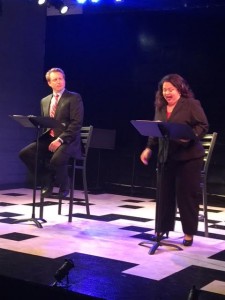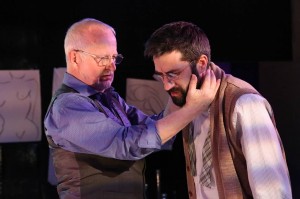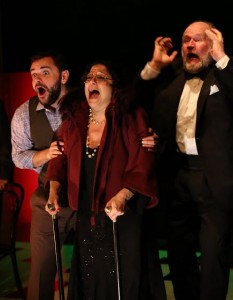A relationship goes crashing into the shores of money, love and drugs during a beach vacation in Krista Knight’s often confusing Selkie, named after a mischievous mythical creature in Scottish folklore. A selkie, also known as a water fairy can transform into beautiful woman with the removal of her magical cloak. Knight’s play, though, is set in a warmer climate. It begins with a married couple, Deanna (Toni Ann DeNoble) and Keaton (Federico Rodriguez), making their way to their hotel room in a foreign country. They’re giddy with excitement and ready to tackle this vacation as if they are on spring break, but they’re actually Americans on an extended trip, for reasons never clarified.
Stand-Up Presidential Campaign
Filibusted, a comic review of the current presidential campaign, is the brainchild of producing artistic director of the Phoenix Theatre Ensemble, Craig Smith, who approached stand-up comic, Al Pagano, with the suggestion of an hour-long burlesque on the national free-for-all into which the sacred task of electing the next leader of the free world has devolved. If this campaign is notable for a public that looks to outlier candidates not beholden to big money and who tell it like it is, what better way to cut through the bombast, double talk, pomposity, dogma, pretentiousness and, yes, lies, than with the gentle and not so gentle barbs of humor.
Written and performed with enthusiasm by Al Pagano and Amy Loughead, Filibusted is a reference to the perfectly legal stymying of the legislative process in the Senate with endless babble; and clearly a comment on the vociferous if also loud and meandering voices in a field of presidential hopefuls who compete mercilessly for our attention as we stumble forward in our selection of a president. It is we voters who are “filibusted” in the process, Pagano and Loughead point out. Hence the brilliant and eye-opening decision of Pagano to allow the candidates to speak for themselves, as Pagano tells us at the very outset:
“Now the reason we aren’t just jumping right into the show is that we want you to know that most of the words this evening which are attributed to the candidates are actually the candidates’ own.” Yes, let ‘em hang themselves on ropes of their own fashioning! “We didn’t change, alter or manipulate much of what they said in any way... we just took their words (out of context) and like pieces of a puzzle, inserted them into scenes of our imagining, to serve our own ends.”
Just as a surgeon might cover all of the body save the segment to which she will apply her knife, Pagano and Loughead thus manage to isolate comments by our candidates, the better to hold them up for all to view and dissect. All of this is wrapped, we are told, in “a series of scenes, sketches and games,” and here begins the fun. Between opening and closing salvos (Sarah Palin and Hillary Clinton), we will hear candidates opine on topics such as flirting (“All the women on 'The Apprentice' flirted with me, consciously or unconsciously. It’s to be expected," says Donald Trump), prenuptials, safe sex (“I’m not sure we need a half a billion dollars for women’s health issues,” says Jeb Bush), staying in shape and threesomes. We will be treated to an imagined Schwarzenegger riff on amending the constitution to allow him to enter the field of candidates and listen to the privileged power brokers of our time cravenly compete in a “race to the bottom” of their hard luck stories to suggest to voters that they are who they are not: just ordinary Joes scrambling for a living like you and me (“My school had these popcorn balls ad they looked really good. But they were a nickel. I never had a popcorn ball,” says Ben Carson).
The estimable surgeon Carson is given a sketch of his own, the better to highlight such statements as “A lot of people who go into prison straight and when they come out, they’re gay, so did something happen while they were in there?” And he asks, “How about we have a transgender bathroom? It’s not fair for them to make everybody else uncomfortable.” Although clearly a man of enormous experience in his chosen field, he alludes to the fact that he has never held office noting that, “every signer of the Declaration of Independence had no federal elected office experience.”
Stand-up includes gesture along with the written word to make its point and the exaggerations of mime in capturing the candidates was especially illuminating. Perhaps the most inspired sketch was the one called “Immigration Game” in which the audience is treated to a panorama of comments over centuries on immigration and quizzed, in multiple choice format, as to the author of the quote—present candidate or figures from the past. But better not to give away the store and leave the leavening and illumination of this sketch to the occasion of your attendance at this engaging and witty performance.
Filibusted's last performance is at 10 p.m. on Feb. 13 at The Wild Project (195 East 3rd St. between Avenue A and B) in Manhattan. Tickets are $20 and include one drink. For tickets, call 212-352-3101 or visit http://www.phoenixtheatreensemble.org/filibusted/.
Payment of Revenge
In this world, it seems everyone is indebted to someone for something; a job, a simple favor or an important introduction. The grateful understand this and are appreciative, often "paying it forward." However, not everyone who goes out of his or her way for another does so with a kind heart. Generosity of spirit may be misread, or at other times, the creditor plans to collect somewhere, sometime. The central theme of Creditors, written by Swedish playwright August Strindberg, weaves a demanding tale of love—controlling love and abandoned love—and, unfortunately, exacting revenge as when the creditor makes a well-planned and malicious visit. Creditors is currently playing at The Wild Project through Feb.14 and is presented by Phoenix Theatre Ensemble.
Through the filtered afternoon light of vertical blinds, disheveled artist Adolph (Josh Tyson), is fumbling with a new sculpture surrounded by finished and unfinished paintings. He is an accomplished artist who has driven himself to the edge of sanity and good health producing painting after painting, yet full of self-doubt and insecurity now toying with the idea of sculpture. His acquaintance, Gustav (Craig Smith), in an off-white summer suit and untied bow tie meanders the stage, replenishing his cocktail often. Goading Adolph in a familial manner, Smith embodies the part as an art dealer might, critiquing the work and then, just as easily, reverts to roll of doctor imparting medical diagnoses. He appears to know more than the casual friend often chiding the fragile Adolph, or at times, touching him intimately on the face. Eventually, Gustav maneuvers the conversation to Adolph’s wife Tekla, who has been away on a short holiday. Here is where Gustav frenetically whips up the dialogue to further lead Adolph down a rabbit hole of despair, teetering into the world of jealousy. It is clear that Adolph’s health and mental state are at risk.
Tekla (Elise Stone) brightly arrives after Gustav scurries off to secretly observe the interaction of the couple. In his fragile state, Adolph attempts to test her fidelity. Tekla, obviously older than her husband, desires to be adored and has no interest in sitting at home or being lectured about her flirtations. Stone’s voice is alluring even when her dialogue is burdened with childlike terms of endearment; she refers to them as "brother/sister." Tekla floats nervously across the stage in a diaphanous gown hoping to appease her husband as their disagreements intensify.
Woven throughout the dialogue is the reoccurring argument—who "made" whom. The older, educated Gustav used his position in a Pygmalion manner to bring language and style to her when she was young, a world she later abandoned. It appears as if Adolph picks up where Gustav left off. Adolph’s success as an artist may have allowed Tekla the time to write a successful book while introducing her to society but at what cost? Gustav’s students poked fun at him when they realize he was characterized in her book as a stupid fool. Anger, resentment and revenge have been fomenting—the creditor is demanding payment. Stone, Tyson and Smith deliver.
In 1888, Strindberg created a fast paced and uncomfortable, revenge-driven script in Creditors. (The current translation is by David Greig.) Kevin Confoy took complete advantage of the brisk dialogue with his direction by giving the actors the space to move about and the motivation behind the written words.
The set is a villa at the shore strewn with art and art supplies, an ample bar cart and a fainting couch. At the back of the stage hanging on a line are simple line drawings on paper. On either end of the drawings, the two stage entrances; one to the lobby of the villa and arriving ferry, while the other implies more rooms of the suite.
The entrances are lit with colors that change with a scene and during a scene. While emphasizing the mood of the dialogue, the lighting change is too noticeable at times. An interesting use of lighting is in the second scene where the bottom of the art, hanging at the rear of the stage, is lit in a razor’s edge blue underscoring an ugly undercurrent of the script. Credit for both set and lighting design goes to Tsubasa Kamei.
Although not an endearing play, Creditors is captivating and full of well-crafted characters. Stone brings the middle-aged woman not wanting to be considered old, and longing to be desired, to full breadth. The young, tortured artist and husband, who really does love his wife, is fully present in Tyson. Smith, the jilted, revengeful lover delivers a multi-faceted character to the stage through his frenetic action and vocal cadence. He easily transitions from devious to charming and almost caring as he exacts his final, gloating revenge.
Creditors is presented by Phoenix Theatre Ensemble and runs through Feb. 14 with a mix of evening and matinee performances at The Wild Project (195 East 3rd St. between Aves. A and B) in Manhattan. Tickets are $25 and can be purchased by calling 212-352-3101 or visiting http://www.thewildproject.com/performances/2016-CREDITORS.shtml.
Quatorze, Rouge, Manqué, Pair!
The Gambler opens much like a Sunday afternoon in the Arbat District of Moscow in the 1800s—the cast strolling across the stage familiarizing us to the characters. Charming, enigmatic, prideful, stuffy and arrogant are just a few attributes that come to mind when observing each character. Glyn Maxwell’s play, based on the 1866 Fyodor Dostoevsky novella of the same name, is currently running at The Wild Project in New York City through Feb. 14. Dostoevsky, in a time of financial difficulties brought on by an out-of-control gambling habit, dashed off the novella to pay down debts basing the work on his current state of affairs. The set is perfectly stark with a bench and four chairs, which are aptly utilized throughout the one hour and 45 minute performance. Lighting, by Tsubasa Kamei, creates scenes perfectly suited to the sparse set, although some shadows need to be addressed. The playwright crafted an ensemble piece in The Gambler, and with the direction of Karen Lordi-Kirkham, we are invited to experience a vivid ensemble, led by the affable Alexi, played by John Cosentino. What Cosentino is truly capable of becomes evident during an interchange with Matt Stapleton, who brings all the best qualities of a Brit as Astley. Rounding out the suitors is Joseph J. Menino, portraying the ruthless French investor, de Grieux, who delivers an equal amount of bravado and rich mannerisms to his character.
These three suitors, each in their own style, desire the attention and hand of Polina, (Poppy Liu) the General’s niece and ward. Polina is conniving in a schoolgirl way, and yet, “is no one’s ward,” further declaring, “I am no one’s anything.” Given as much rousing attitude as comes through in Liu’s words and expressive eyes, a more upright attitude in her posture would have been an added bonus. Whereas next to Alexi, whose posture takes on downtrodden, subservient qualities, Polina requires the stature her upbringing would have taught her thus far in life.
John Lenartz effusively rounds out the performance as retired General Zagorski, with the vibrant Elise Stone bursting on the stage as Antonida Tsareyevitch Vassilyevna, referred to as "Granny." Add the convincing, conniving and climbing Morgan Rosse as Blanche de Cominges and the ensemble is accomplished, deep and tight. The director provides them with ample opportunities to bring their best; the carriage ride, the soup scene, and of course, the roulette table! It’s hard to take your eyes off Granny, Alexi and the General at the table as all the characters have a stake in the outcome. They each bring the scene into existence in their own delightful style.
The details are where the script becomes uneven, lacking deference to Russia and St. Petersburg in the 1860s, which is most evident with Granny’s pronouncement, “You’re not getting a f*#@*ing ruble!” And then her use of the word, "Frenchie," at the roulette table, or when she refers to her mode of travel as a "choo-choo train." For a wealthy Russian aristocrat who is richly colorful, her dialogue comes off childlike or common at times. Even referring to her character as "Granny" rings odd. Polina is spoken of as “a Russian spiritual young soup-stirring lady.” While her character may be spirited, she exhibits little in the way of spirituality.
Ellen Mandel deftly handles the sound design along with original music for the opening and closing. The gentle clacking of the carriage ride, the crystal and china effects at the dinner table, and the spinning wheel of the roulette table added to the experience and never overplayed the actors. Homage to Dostoevsky and the rich music of Russia, though, would have only added to the experience.
Costume designer Jennifer Stimple-Kamei delivers clothing and jewelry befitting of the characters and is well done for the most part. Alexi is attired in brown tones and a vest very much in keeping with his position, while the General, Blanche, de Grieux, Astley and Granny wear their wealth and class smartly. Polina’s costume and hair, however, occurs as an afterthought sporting a very lightweight long blue skirt and cream-colored camisole. The youthful Liu embodies a present-day feel rather than a Russian heiress in the 1860s. More options, in keeping with the period, seem readily available with Liu’s beautiful long hair than a simple ponytail.
While you might think Dostoevsky was writing about his own predilection with a title like The Gambler, you’ll find that with the exception of the Grandmother in this production, everyone delivers his or her own version of a gambling problem. No one better, though, than Alexi holding a coin high at the roulette table eagerly placing one more bet.
The world premiere of The Gambler is presented by Phoenix Theatre Ensemble, and runs through Feb.14 with a mix of evening and matinee performances at The Wild Project (195 E 3rd St. between Avenue A and B) in Manhattan. Tickets are $25 and can be purchased by calling 212-352-3101 or visiting phoenixtheatreensemble.org/the-gambler.












